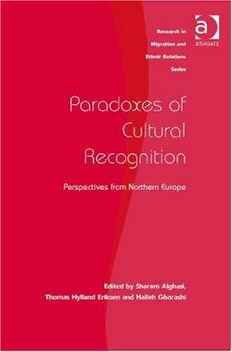
Paradoxes of Cultural Recognition PDF
319 Pages·2009·2.714 MB·English
Most books are stored in the elastic cloud where traffic is expensive. For this reason, we have a limit on daily download.
Preview Paradoxes of Cultural Recognition
Description:
Mobility is becoming a key issue in social theory, with people moving between countries on diverse grounds and in diverse ways whether as tourists, refugees, students, temporary workers, labour migrants or family members of prior migrants. In this setting characterized by flux, minorities are often marked by their alleged culture, which is then taken to account for their relative successes or failures in adapting to their host society; culture also being invoked in accounts of social problems such as crime, educational failures and oppression of women.Explicity comparative in its approach, ''Paradoxes of Cultural Recognition'' discusses central issues regarding multiculturalism in today's Europe, based on studies of Norway and the Netherlands. Distinguishing clearly the four social fields of the media, education, the labour market and issues relating to gender, it presents empirical case studies, which offer valuable insights into the nature of majority/minority relationships, whilst raising theoretical questions relevant for further comparisons.With clear comparisons of integration and immigration policies in Europe and engagement with the questions surrounding the need for more culturally sensitive policies, this volume will be of interest to scholars and policy makers alike.
See more
The list of books you might like
Most books are stored in the elastic cloud where traffic is expensive. For this reason, we have a limit on daily download.
